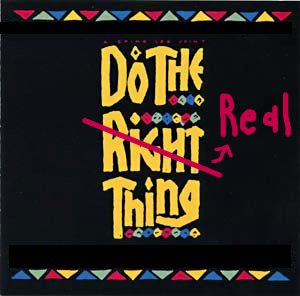Recently, 5th and 6th grade girls in the school where I work came up to me in the hallway and volunteered, “I want to be an engineer.” While this is heartwarming, especially given the political rhetoric behind the importance of S.T.E.M. and the challenges of gender underrepresentation in the sciences, I would like to draw a totally different lesson for educators.
 Anyone who knows anything about my teaching knows that I would never spend any time on “career education” with kids I teach. I create the context, conditions and projects during which children are engaged in engineering. When building and programming robots, the kids are engineers – not contemplating a career for a dozen years later. The kids are smart enough to connect the dots and identify interest in a career related to their talent, interests or present mood, even if that interest is short-lived.
Anyone who knows anything about my teaching knows that I would never spend any time on “career education” with kids I teach. I create the context, conditions and projects during which children are engaged in engineering. When building and programming robots, the kids are engineers – not contemplating a career for a dozen years later. The kids are smart enough to connect the dots and identify interest in a career related to their talent, interests or present mood, even if that interest is short-lived.
Time is the rarest of currencies in school. Therefore, time should be focused on authentic experiences, not meta experiences.
Affective qualities like collaboration, passion, curiosity, perseverance and teamwork are certainly desirable for teachers and students. However, these traits may be developed while engaged in real pursuits, even within the existing curriculum. All that is required is a meaningful project. This is why I question the use of “meta” activities like ropes courses, ice-breakers or trust-building exercises as a form of professional development or separate curriculum. Professional development resources are also scarce. Therefore, PD should be focused on learning to do or know. The affective skills should be byproducts of meaningful experiences intended to improve teaching.
Adults become better teachers when they enjoy firsthand learning adventures like they desire for their students. You can’t teach 21st Century Learners if you haven’t learned this century. That is why I created Constructing Modern Knowledge.
Some educators have recognized that schools are too impersonal and that teachers should get to know their students. I could not agree more. However, the prescription is often to create advisory courses or extend homeroom to deal with pastoral care issues. The result is one teacher who gets to “know” students and time is borrowed from other courses where teachers should get to know their students formally and informally in the process of constructing knowledge together.
Sit next to a student engaged in a science experiment and talk with them. Lead vigorous discussions or chat with a kid about the book they’re reading. You don’t need a class period set aside for asking “How was your weekend?” or for building trust. Join a group of students for lunch. Say, “hi,” while passing in the hallway. Dennis Littky tells the story of making Time Magazine because as a school principal he greeted students when they entered school in the morning. Have we lowered our expectations so much that knowing students is some sort of awesome systemic accomplishment? Humane, thoughtful, even casual interaction between teachers and students does not require an NSF grant or special class.
When educators create a productive context for learning, achievement improves, students feel more connected and behavioral problems evaporate. For three years, Seymour Papert, colleagues and I created a learner-centered, project-based alternative learning environment for at-risk learners inside of a troubled prison for teens. When the needs, interests, passions, talents and curiosity of our students were put ahead of a random list of stuff, they were not only capable of demonstrating remarkable competence, but there was not a single discipline incident in ever that required a kid to leave the classroom.
Students can develop self-esteem by engaging in satisfying work. Classroom management is not required when teachers don’t view themselves as managers. Kids can learn “digital citizenship” while learning to program, sharing code and interacting online. They can feel safe at school by forming relationships with each of their teachers. Study skills are best gained within a context of meaningful inquiry.
Learning is the best way to learn. Accept no substitutes!
Veteran educator Gary Stager, Ph.D. is the author of Twenty Things to Do with a Computer – Forward 50, co-author of Invent To Learn — Making, Tinkering, and Engineering in the Classroom, publisher at Constructing Modern Knowledge Press, and the founder of the Constructing Modern Knowledge summer institute. He led professional development in the world’s first 1:1 laptop schools thirty years ago and designed one of the oldest online graduate school programs. Gary is also the curator of The Seymour Papert archives at DailyPapert.com. Learn more about Gary here.
